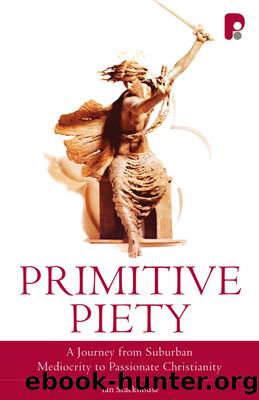Primitive Piety: a Journey from Suburban Mediocrity to Passionate Christianity by Stackhouse Ian;

Author:Stackhouse, Ian;
Language: eng
Format: epub
Tags: ebook, book
ISBN: 3116662
Publisher: Authentic Media
Published: 2012-10-01T00:00:00+00:00
Six
Surprised by Joy
Either we dismiss the Good News as too good to be true, or we permit ourselves to be overwhelmingly joyful persons because of it.
Brennan Manning, The Signature of Jesus
Umberto Eco is one of the most celebrated intellectuals of our day. He came to public attention with his novel The Name of the Rose.1 Unfortunately, having watched it as a film before reading it as a novel, I cannot imagine William Baskerville as anyone other than James Bond in a monkâs garb, since the part is played by Sean Connery. But be that as it may, Ecoâs bestselling novel tells the story of a Dominican community in the Italian mountains where a series of murders take place. Baskerville, a Franciscan sleuth, is called in to investigate and eventually traces the crimes to the old, blind librarian Jorge, who exercises a pathological hatred of anyone who so much as gets near a certain book: namely, the second book of the Poetics of Aristotle, in which the great philosopher writes about the virtues of laughter. So great is Jorgeâs fear that the students will read this book that he laces the book with poisonous ink.
It seems an odd book to want to forbid. One could understand a monastery wanting to ban some medieval equivalent of Lady Chatterleyâs Lover, say, or the latest Jackie Collins, but to ban a book about laughter seems preposterous. Laughter is what makes us human. But Jorgeâs fear â and on this he represents the fear of the church as a whole â is that to permit laughter is to allow victory to the devil. Laughter for the old monk represents âweakness, corruption, the foolishness of our flesh. It is the peasantâs entertainment, the drunkardâs licence.â2 To permit laughter, or rather for the monks to know that the great philosopher Aristotle encouraged laughter, would mean that the people of God âwould be transformed into an assembly of monsters belched forth from the abysses of the terra incognita, and at that moment the edge of the known world would become the heart of the Christian empire, the Arimaspi on the throne of Peter, Blemmyes in the heart of the monastery, dwarfs with huge bellies and immense heads in charge of the library.â3
Well, if old Jorge was fearful that the church in subsequent generations would break out in mirth, he neednât have been. The church, throughout history, has hardly been noted for its jollity. Quite the opposite. As Robert Louis Stevenson noted in his journal: âI went to church today and am not depressed,â presumably because his usual experience was to come away feeling utterly bleak.4 I read somewhere, though I cannot find the source, that there was a certain man who was so morose that the last thing he did before going to church was to take the perch out of the budgieâs case. I guess he felt that if he wasnât going to have fun on the Lordâs Day then neither was his pet budgie. Indeed, certain Christian traditions seem to make a virtue of their dourness.
Download
This site does not store any files on its server. We only index and link to content provided by other sites. Please contact the content providers to delete copyright contents if any and email us, we'll remove relevant links or contents immediately.
The 5 Love Languages: The Secret to Love That Lasts by Gary Chapman(8552)
The Space Between by Michelle L. Teichman(6105)
Assassin’s Fate by Robin Hobb(5263)
Wiseguy by Nicholas Pileggi(4616)
Everything Happens for a Reason by Kate Bowler(4079)
Gerald's Game by Stephen King(3937)
A Simplified Life by Emily Ley(3586)
The Power of Positive Thinking by Norman Vincent Peale(3468)
Pillow Thoughts by Courtney Peppernell(3434)
Resisting Happiness by Matthew Kelly(2896)
Girl, Wash Your Face by Rachel Hollis(2832)
Being Aware of Being Aware by Rupert Spira(2718)
Name Book, The: Over 10,000 Names--Their Meanings, Origins, and Spiritual Significance by Astoria Dorothy(2501)
Real Sex by Lauren F. Winner(2492)
More Language of Letting Go: 366 New Daily Meditations by Melody Beattie(2461)
The Holy Spirit by Billy Graham(2436)
Fast Facts on Defending Your Faith by John Ankerberg & John Weldon(2400)
Victory over the Darkness by Neil T. Anderson(2396)
The Secret Power of Speaking God's Word by Joyce Meyer(2264)
